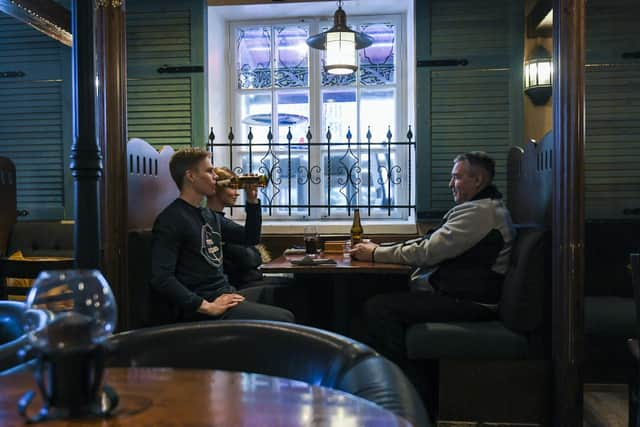Scotland should learn a lesson about alcohol advertising bans from Scandinavia – John McLellan
The excitement was undimmed by a force-eight gale in the North Sea because the one thing we didn’t need to be taught on this educational voyage was the legal drinking age in Scandinavia was 16 and as soon as we docked in Aarhus it was straight to the pub. Same story in Stockholm, but as we were late back our punishment was being confined to the ship at night so we couldn’t go on the razzle in Helsinki. However, it was game back on for the final stop in Copenhagen. Only one of us didn’t drink, but smart man that he was, he went on to amass a fortune flogging booze in a string of nightclubs and bars.
The association with drinking and having fun runs deep in the Scottish psyche as it does in most developed countries, not least in Scandinavia and the Baltic states where tackling problem drinking has resulted in the imposition of a raft of restrictions. The Scottish Government is keen to follow suit by banning the advertising and marketing of alcohol, but none of those countries has the same economic relationship with strong drink as Scotland has with whisky.
Advertisement
Hide AdAdvertisement
Hide AdOK, so Carlsberg is big in Denmark, but alcohol products are not in the top ten of its £94 billion worth of exports, led by pharmaceuticals at 15 per cent. Even famous Danish bacon is sixth with 3.4 per cent. Including the rest of the UK, Scotland’s total exports in 2019 were £87bn, but whisky alone accounted for 14 per cent of international exports, with £5bn out of £35bn. Last year it reached £6.2bn, so a situation could arise where one of Scotland’s most important products cannot be actively sold at home, while the likes of Irish whiskey and American bourbon could be sold online via platforms beyond the Scottish Government’s control.
Thanks to the International Alliance for Responsible Drinking, which feeds data to the World Health Organisation, I’ve been able to go on a modern Baltic booze cruise to see how those restrictions have impacted on alcohol consumption, and the answer is not very much. Estonia tightened its rules in 2018, but some categories have since seen an increase in consumption, most notably a 12 per cent rise in spirits and 11 per cent rise in beer drinking in the following three years.
Across the Gulf in Finland, it was a similar story after the passing of the 2017 Alcohol Act, and although there has been a four per cent fall in consumption of strong spirits, beer is unchanged and wines and weaker spirits are up. Lithuania also toughened up its rules in 2018 and now has an almost total marketing ban, but strong spirits went up 12 per cent from 2019-21 and beer by four per cent.
But the most extraordinary place is Norway, where there has been an absolute ban since 1975, and according to Numbeo, reputedly the world’s largest cost-of-living database, it is the third most expensive place to buy a beer in the world, behind Qatar and the United Arab Emirates. So with no marketing allowed and eye-watering prices, if such policies were effective in reducing alcohol consumption it would be evident here, but the data shows beer consumption rose 20 per cent from 2016 to 2021, strong spirit consumption was up by a third and standard 12.5% wines soared by 44 per cent. One explanation could be the inability to control online advertising on sites hosted overseas, but if so that only serves to illustrate how ineffectual such domestic advertising prohibition can be.
The Scottish Government’s justification for a marketing ban is two-fold, to limit the influence on young people and assist recovering alcoholics. The consultation which closes on Thursday does not go into questions of effectiveness or the wider economic impact it would have on the manufacturing, retailing and hospitality sectors which have been hammered by the pandemic and inflation.


Now they face the imposition of the Scottish Government’s ruinous deposit return scheme (DRS) in August, and a similarly ill-considered advertising ban would make businesses pay a high price for poor SNP policymaking, with agendas pursued despite evidence, not because of it. Just like gender recognition reform, it has become standard practice for public consultations to start with the outcome and then for politicians to claim those affected had been listened to, only for concerns to be dismissed.
The Scottish Government’s controversial Health and Wellbeing Census of school pupils published last week clearly demonstrated the bigger problem amongst young people is not alcohol, but drugs. The overall figure for S4 pupils shows 87.2 per cent are not drinking at all, but a quarter of S4 boys and 10.6 per cent of girls are taking illegal drugs at least once a week.
With 1,245 alcohol-specific deaths in Scotland in 2021 compared to 1,444 drug poisoning deaths, of which 1,330 were from misuse, the causes are more likely to be found in societal and deprivation issues, not slick marketing. But having failed miserably to tackle drug deaths, the worst rate in Europe, a ban on alcohol advertising looks like an easy way to be seen to be doing something, even though the evidence from Scandinavia strongly suggests it will make no difference, certainly not while the underlying causes remain untouched.
Advertisement
Hide AdAdvertisement
Hide AdNeither does the alcohol advertising consultation seek suggestions as to what might positively contribute to reducing consumption, such as education and pro-active campaigns to encourage moderation or abstinence. And as the Office for National Statistics’ UK data shows 27 per cent of 16-24-year-olds in 2016 said they were teetotal, compared to 19 per cent in 2006, the evidence suggests young people take a more responsible approach to booze than my generation. Drugs is another story.
Comments
Want to join the conversation? Please or to comment on this article.
